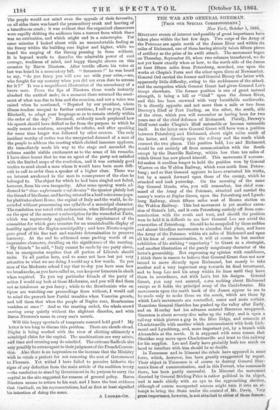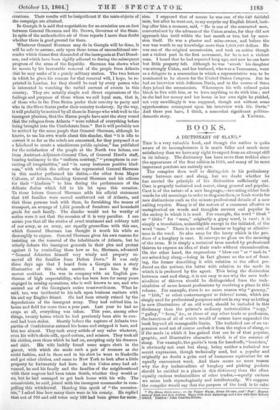MILITARY events of interest and possibly of great importance have
taken place within the last few days. Two corps of the Army of the Potomac are again north of the James River and within six miles of Richmond, one of them having already taken fifteen pieces of artillery as the prize of its swift attack. The movement began on Thursday, September 29, when two columns transferred, we do not yet know exactly when or how, to the north side of the James at least fifteen miles from Petersburg, marched, one upon the works at Chapin's Farm and the other upon those at Newmarket.
who fought for my country when you did not even dare to scream General Ord carried the former and General Birney the latter with apparently little difficulty, owing to the suddenness of the attack and the occupation which General Grant had given General Lee's troops elsewhere. The former position is one of great natural
strength, it being a bill or "bluff " upon the James River, ment of what was due to him and the occasion, and not a voice was and this has been crowned with very formidable earthworks. raised when he continued, " Deputed by our president, whom It is directly opposite and not more than a mile or two from illness renders unequal to further exertions, I call on you, Count
Drewry's Bluff or Fort Darling, on the other, the south, side Ricciardi, to adapt your language so as to remain strictly within of the river, which you will remember as having been for two the order of the day." Ricciardi, evidently much perplexed how years one of the chief defences of Richmond. Plainly, Drewry's his speech should have drifted so far from the purpose to which he Bluff must make Chapin's Bluff untenable or become untenable really meant to conform, accepted the rebuke, and after speaking itself. In the latter case General Grant will have won a position for some time longer was followed by other orators. The only between Petersburg and Richmond, about eight miles south of incident worthy of notice was the unexpected demand of a man of the latter, and directly upon the railway and the roads which the people to address the meeting which elicited immense applause. connect the two places. This position held, Lee and Richmond,
He immediately made his way to the stage and ascended the would be cut entirely off from communication with the South tribune amidst visible excitement as to the sense. of his remarks. except by the Danville Railway, within less than ten miles of I have since learnt that he was an agent of the party not satisfied which Grant has now placed himself. This movement if success- with the limited scope of the resolution, and it was certainly good ful makes it needless longer to hold the position won by General tactics to send ahead a man whom it would have been more diffi-
Warren on the W eldon Railway, which runs south from Peters- chlt to call to order than a speaker of a higher class. There was burg ; and so that General appears to have evacuated his works, an interest awakened in the man in consequence of the class he but by a march forward upon those of the enemy, which he belonged to. The object for which he had been singled out failed, attacked and took yesterday. On the morning of the same however, from his own incapacity. After some opening words ad- day General Meade, who, you will remember, has chief corn-
dressed to" those unfortunate confederates" the speaker plainly lost mend of the Army of the Potomac, attacked and carried the
the thread of his theme, and having uttered in a loud voice some popu- enemy's works at Poplar Grove, upon the Petersburg and Lynch- lar platitudes about Rome, the capital of Italy and the world, he de- burg Railway, about fifteen miles west of Reams station on scended without pronouncing one syllable of a municipal character. the Weldon Railway. This last movement is yet another eaten- The resolution was voted with acclamation, when Ricciardi proposed sion of Grant's left, and it cuts Petersburg entirely off from com- on the spur of the moment a subscription for the wounded at Turin, munication with the south and west, and should the position which was rapturously applauded, but the appointment of the won be held it is difficult to see how General Lee can avoid the committee for which gave occasion for an unmistakeable display of evacuation of Petersburg. Should he be compelled by these sudden hostility against the Naples municipality ; and here Nicotera again and almost bloodless movements to abandon that place, and leave "• My friends " he said, " Italy cannot be made by one party alone, and another illustration of the purely sanguinary character of the with A Loom-Ore. great importance, however, is not attached to either of those demon-. strations. Their results will be insignificant if the main objects of the campaign are attained.
In Georgia it is said that negotiations for an armistice are on foot between General Sherman and Mr. Brown, Governor of the State. In spite of the authoritative air of these reports I more than doubt whether there is good ground for them.
Whatever General Sherman may do in Georgia will be done, it will be safe to assume, only upon those terms of unconditional sur- render which Grant first demanded of the insurgents at Fort Donel- son, and which have been rigidly adhered to during the subsequent progress of the arms of the Republic. Sherman has shown what he means by his inexorable removal of the people from Atlanta that he may make of it a purely military station. The two letters in which he gives his reasons for that removal will, I hope, be re- printed in London, for they should be read by every person who is interested in watching the turbid current of events in this country. They are notably simple and direct expressions of the feelings and purposes of those whom we call loyal men, that is, of those who in the Free States prefer their country to party and who in the-Slave States prefer their country to slavery. By the way, it will probably be noticed by all those in Europe who wish well to the insurgent planters, that the Macon people have sent the story round that the refugees from Atlanta " were robbed of everything before being brought into the Confederate lines." But it will probably not be noticed by the same people that General Sherman, although he knows, to use his own words about this slander, that " it is idle to correct it so far as the rebels are concerned, for they purposed it as a falsehood to create a mischievous public opinion," has published for the satisfaction of the people at the North two letters, one from Assistant-Adjutant-General Clan, of General Hood's staff, bearing testimony to the " uniform courtesy," " promptness in cor- recting all irregularities," and " in many instances positive kind- ness," with which the officer who represented General Sherman in this matter performed his duties,—the other from Mayor Calhoun, of Atlanta, thanking General Sherman and his officers for their " kindness " to him during the performance of the delicate duties which fell to his lot upon this occasion. To these letters General Sherman adds his official statement that 446 families were moved southward out of Atlanta, and that these persons took with them, he furnishing the means of transport, an average of 1,651 pounds of furniture and household goods for each family. The slander would not be worthy of notice were it not that the occasion of it is very peculiar. I can assure you that all the stories of cruel treatment and robbery told of our army, as an army, are equally groundless with this one, which General Sherman has thought it worth his while so thoroughly to expose. General Sherman gives his own reasons for insisting on the removal of the inhabitants of Atlanta, but he utterly defeats the insurgent generals in their plea and protest against it by reminding' them how as he, Sherman, advanced " General Johnston himself very wisely and properly re- moved all the families from Dalton Down." It was only three days ago that I heard from a Georgia man a story illustrative of this whole matter. I. met him by the merest accident. He was in company with an English gen- tleman of high respectability, who has been here for many years engaged in mining operations, who is well known to me, and who assured me of the Georgian's entire trustworthiness. What he said, too, was incidental to his talk upon business matters with his and my English friend. He, had been utterly ruined by the depredations of the insurgent army. They had robbed him in house and field for more than a year past. Last year he had no crops at all, everything was taken. This year, among other
things, twenty horses which he had previously been able to con- ceal had been stolen. Shortly before the capture of Atlanta two
parties of Confederates entered his house and stripped it bare, and him too almost. They took every article of any value whatever, even his wife's skein-silk, spool-cotton, and scissors. They took all his clothes, even those which he had on, excepting only his drawers and shirt. His wife luckily found some negro cloth in the garret, with which she made such a pair of trousers as she could fashion, and in these and in his shirt he went to Nashville and got other clothes, and came to New York to look after a little property he fortunately had here. As the Union army had ad- vanced, he and his family and the families of the neighbourhood with their negroes had been taken South, whether they would or no, but he had managed to get back home with his wife. The secessionists, he said, joined with the insurgent commander in com- pelling this withdrawal. Hearing him speak of " the secession- ists," I asked him how many there were in his county. He replied that out of 700 and odd votes only 160 had been given for seces-
sion. I supposed that of course he was one of the 540 faithful men, but after he went out, to my surprise my English friend, look- ing after him a moment, said, " He is one of the converted men, converted not by the advance of the Union armies, for they did not approach him until within the last month or two, but by seces- sion itself. He was a planter and mine-owner, and before the war was worth to my knowledge more than 1,000,000 dollars. He was one of the original secessionists, and took an active though not a violent part in the first movement, for he is not a violent man. I heard that he had repented long ago, and now he can have but little property left. Although he was secesh ' his daughter was strongly Union, and her husband, who was a Tennessean, went as a delegate to a convention in which a representative was to be nominated to be chosen for the United States Congress. But he had an interview with Jefferson Davis, and in the course of three days joined the secessionists. Whereupon his wife refused point blank to live with him, or to have anything to do with him ; and as she had her money and her house in her own right he yielded, not very unwillingly it was supposed, though not without some apprehensions consequent upon his interview with Mr. Davis." And there you have, I think, a somewhat significant politico-































 Previous page
Previous page